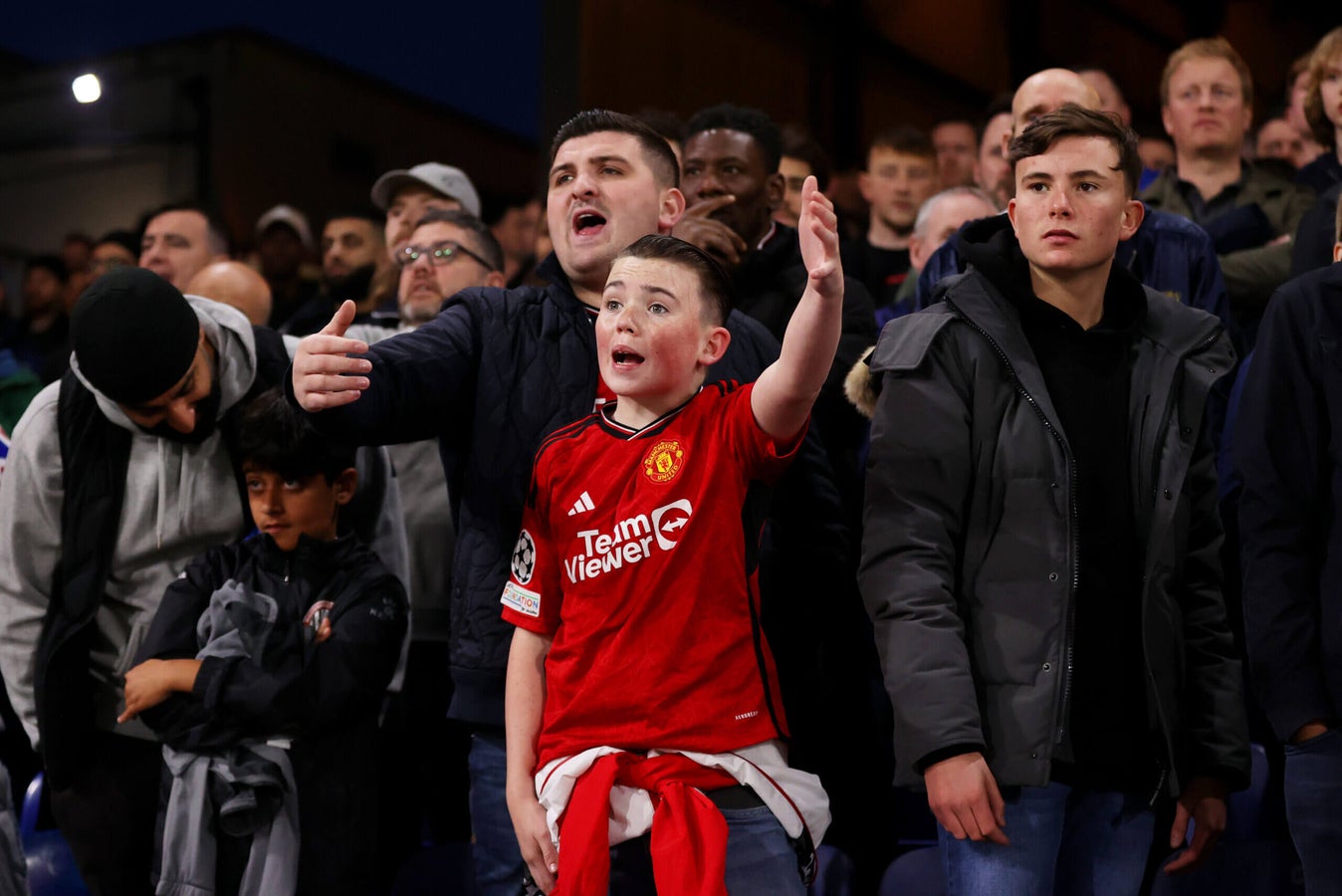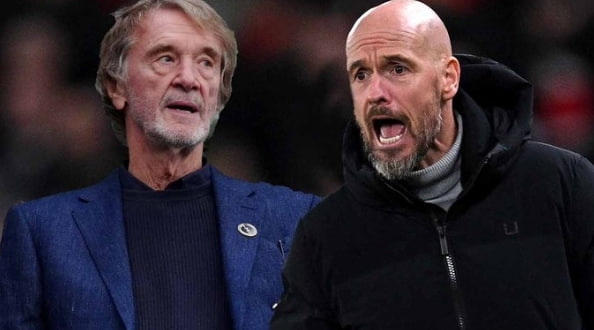On Christmas Eve 2023, news spread among Manchester United fans around the world: British billionaire Sir Jim Ratcliffe announced that he would invest in Manchester United and buy a stake in the club. For Manchester United, this was like a ray of light in the darkness, exciting many fans.After all, Ratcliffe himself is a Manchester native and has been a loyal Manchester United fan since childhood. He was willing to use his own money to help this historic club overcome its challenges.
At the time, many believed that Manchester United had finally turned a corner. The Ferguson era had been over for years, and the team’s performance had been inconsistent. Fans had been eagerly awaiting a new investor to bring about change. Some optimistic fans even began selling hats emblazoned with “MUGA” (meaning “Manchester United Great Again”) and hoped the team would defeat Manchester City in the FA Cup final and rise again.

However, reality did not turn out as everyone had hoped. Soon after, rumors of layoffs began circulating at Manchester United, and these were quickly confirmed by the club. Employee benefits were cut, and the previous remote work policy was also scrapped. Some veteran coaches and players who had contributed to the team also left, either being fired or forced to accept pay cuts.
This has left many fans furious. They were already dissatisfied with the previous owners, the Glazer family, and now seeing Ratcliffe take the reins and act so “harshly” has only deepened their disappointment. Some feel that while Ratcliffe claimed to be making “tough decisions,” these decisions have ended up hurting too many people.
Profitable on the surface, but not so simple in reality?
While layoffs may sound harsh, Manchester United’s financial statements actually look quite solid. In November 2024, the club released a report stating that it had made significant profits over the past year. They projected that profits for the upcoming fiscal year would reach between 145 million and 160 million pounds, a significant increase from the previous year. This figure also ranks among the top in the Premier League.
Their revenue comes from three main sources: commercial partnerships, broadcast rights, and ticket sales and other on-site consumption. Combined, they expect total revenue of between £650 million and £670 million. It seems that Manchester United is indeed a major business, generating substantial income.
However, interestingly, just a few months later, there were reports that Manchester United was planning to lay off approximately 200 employees. In an interview, Ratcliffe stated that if they did not take this action, the club might go bankrupt. This is somewhat confusing: on one hand, they claim to be making a lot of money, while on the other hand, they say they are on the brink of bankruptcy. Which is the truth?
In fact, the term “profit” is not always straightforward. Different companies can calculate their profits in different ways to make the numbers look better. For example, some companies may spread their expenses over several years, making the books look better in a particular year. So when Manchester United says they are making money, they may just be using a calculation method that favors them.
Fans’ wallets also take a hit
In addition to layoffs, Manchester United has recently taken other actions that have disappointed fans. For example, they have increased the price of matchday tickets for members from the original price to £66 per ticket. Seniors and children no longer receive discounts. Even parking fees for disabled fans have increased, and the small bonuses previously given to staff have been canceled.
The club explained that these measures are necessary to cut costs, as they can no longer sustain operations otherwise. They also wrote to fan organizations stating that over the past three years, Manchester United has incurred losses exceeding 300 million pounds. If no action is taken promptly, they may violate the Premier League’s “Profitability and Sustainability Rules” (PSR), which could result in fines or even a ban from the league.
It’s like a family that earns a decent income each month but spends more than it makes, ending up in the red. Manchester United’s situation is similar: while their revenue is high, their expenses are also extremely high, especially when it comes to spending on players.
Loss-making deals in the transfer market
Since Sir Alex Ferguson’s retirement, Manchester United has spent a staggering 2.1 billion pounds in the transfer market—one of the highest figures in the Premier League. However, how have the players they’ve signed performed? To be honest, the results have been disappointing.
What’s worse, Manchester United has also been unsuccessful in selling players. Other top clubs, such as Chelsea, average 1 million pounds per player sold, while Manchester United only receives around 200,000 pounds. This means they not only overpay for players but also fail to sell them at a good price, resulting in an ever-widening gap between the two figures and increasing losses.
This issue is also evident in the club’s financial statements. The latest report shows that Manchester United now owes a staggering £414 million in “transfer debt,” second only to Chelsea. This amount is not paid in a lump sum but in installments, yet the annual pressure remains immense.
Investment mistakes exacerbate losses
In addition to transfer fee issues, Manchester United has also made numerous managerial mistakes over the years. For instance, they spent a significant amount of money to hire sports director Ashworth from Newcastle, only to fire him after just five months and pay several million pounds in compensation. Another example is head coach Ten Hag, whom the club recently renewed his contract with, only to fire him shortly afterward, costing the club 10.4 million pounds.
They then brought in new coach Amohr and his team, paying Porto 11 million pounds in compensation. This series of moves was highly chaotic and wasted a significant amount of money.
All of this happened after Ratcliffe took over. Many people believe that Ineos (Ratcliffe’s company) lacks experience in running a football club, leading to many unnecessary losses.
The Glazer family is also to blame
Of course, Ratcliffe cannot be held solely responsible for Manchester United’s losses in recent years. The previous owners, the Glazer family, also bear a large share of the responsibility.
In the 2024 financial report, it was revealed that Manchester United incurred an expenditure of 34.6 million pounds related to the sale of shares. In other words, the Glazer family sold their shares to Ratcliffe, earning hundreds of millions of pounds, but the costs associated with these transactions were borne by Manchester United.
Additionally, over the past two years, Manchester United’s annual operating costs have been close to £340 million. This includes various expenses such as catering, security, cleaning, property management, and hosting away matches in domestic cup competitions. On top of that, there are player and staff wages, as well as repayments of the debt left by the Glazer family when they purchased the club, amounting to approximately £20 million annually…
You can imagine that even if a company has high income, it will still lose money if its expenses are higher. This is the situation Manchester United is currently in.
Is the layoff really because the club is “on the verge of bankruptcy”?
At this point, many people may ask: If Manchester United has made so much money, why are they laying off staff? Are they exaggerating the crisis just to save money?
In fact, Manchester United does have significant cash reserves and will not go bankrupt in the short term. So, from a cash flow perspective, layoffs do not seem to be a necessity. However, the problem is that football clubs do not rely solely on daily income to operate. They also need long-term investment, especially in areas such as player recruitment, infrastructure construction, and youth training systems.
Ratcliffe and his team may be thinking long-term, wanting to cut costs and make room for future development.In other words, they are not laying off staff because they are running out of money, but rather to control costs and ensure that future spending does not exceed the budget.
But regardless of the reasons, layoffs will always affect the lives of employees and undermine the confidence of fans. This is especially true for employees who have worked at Manchester United for many years and are suddenly being laid off, which is indeed cruel.
Conclusion: Where does the future lie for Manchester United?
Overall, Manchester United is currently in a complicated situation. On the surface, it is a profitable club, but behind the scenes, it has huge expenses, heavy debts, frequent management changes, and poor performance.
For fans, the most important thing is whether the team can win games and return to its former glory. However, it seems that Manchester United is still searching for a stable path, and it will take time to improve its financial management and team building.
The arrival of Ratcliffe may be a turning point, but it could also be another trial-and-error process. Let’s hope Manchester United can find the right direction soon and stop disappointing its fans.

